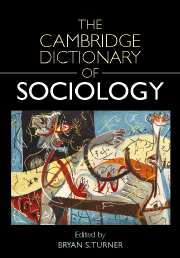N
Published online by Cambridge University Press: 22 October 2021
Summary
narcissism
Associated with the doctrines of Sigmund Freud and psychoanalysis, the term has come to enter sociology as an account of certain pathological trends of modern social life. Often interpreted as a consequence of consumer society and the West's obsession with surface appearances, the rise of narcissism is said to have played a significant role in the shrinkage of public political life, thus promoting a defensive, painfully empty search for self-gratification.
The sociological analysis of narcissism has been plagued by lack of conceptual precision. It is important to distinguish between three related issues: first, psychodynamically, narcissistic disorders have their origin in what Freud termed “primary narcissism” – with the child remaining stuck in a destructive omnipotence, which thus prevents the development of healthy boundaries between self and others. Second, in terms of generations, narcissism is reproduced in capitalist society through parents relating to their children primarily as “investments.” Third, culturally, narcissistic pathology is said to arise not only from capitalism but as a result of globalization, mass communications (see mass media and communications), and the decline of tradition. Contemporary patterns of narcissistic identity-formation are thus conceptualized in sociology as at once thin and precarious, as the self is outstripped by the dislocations and terrors of modernity.
The sociological critique of narcissism is best known through the writings of Richard Sennett, Christopher Lasch, and Joel Kovel.
ANTHONY EL L IOTT
narrative analysis
Narrative as a topic of sociological investigation has a long and diverse history. Interest in narrative has always been predicated on the assumption that to grasp adequately the nature of some aspect of the social world one must analyze one's research subjects’ own understandings of their circumstances. However, many different approaches to accomplishing this project have emerged over the years. The earliest exemplars for narrative analysis in sociology used a combination of data sources including oral histories, biographies, interviews, diaries, letters, and archival records to construct life histories of research subjects.
- Type
- Chapter
- Information
- The Cambridge Dictionary of Sociology , pp. 411 - 419Publisher: Cambridge University PressPrint publication year: 2006



